大学英语精读第三版第二册教案
新视野大学英语(第三版)读写教程第二册完整教案
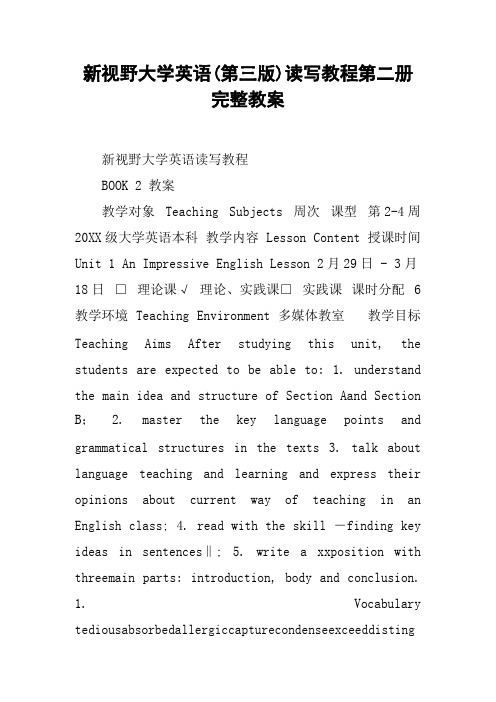
新视野大学英语(第三版)读写教程第二册完整教案 新视野大学英语读写教程 BOOK 2 教案 教学对象Teaching Subjects 周次课型第2-4周20XX级大学英语本科教学内容 Lesson Content 授课时间Unit 1 An Impressive English Lesson 2月29日 - 3月18日□理论课√理论、实践课□实践课课时分配 6 教学环境 Teaching Environment 多媒体教室教学目标Teaching Aims After studying this unit, the students are expected to be able to: 1. understand the main idea and structure of Section Aand Section B; 2. master the key language points and grammatical structures in the texts 3. talk about language teaching and learning and express their opinions about current way of teaching in an English class; 4. read with the skill ―finding key ideas in sentences‖; 5. write a xxposition with threemain parts: introduction, body and conclusion.1. Vocabulary tediousabsorbedallergiccapturecondenseexceeddistinguishdistinctivexxplimentaryxxplementaryproclaimevid entlyadequatexxpetentadjustbeneficial 2. Skills ● Learn to read with the skill ―finding key ideasin sentences‖and write a xxposition with threemain parts: introduction, body and conclusion. ●To talk about language teaching and learning ●write a xxposition with threemain parts: introduction, body and conclusion. ●To apply the phrases and patterns 重点Key Issues 难点PotentialProblems and Difficulties 教学方法Methodology A xxbination of traditional teaching methods with the xxmunicative approach will be adopted. Special attention should be paid to classroom interaction like questioning and answers. Small group works are always needed while discussing the questions and the difficult translation encouragement is needed and more guidance will be given in their extracurricular study. Visual aids, projector, stereo and microphone 教具Teaching Aids 教学分组Teaching Groups Group work and pair work 课堂学习任务与活动的组织Conduct of Tasks and Activities Students-centered Task-based teaching and learning 教学过程设计Teaching Procedures 步骤1Step 1 导入Lead-in warming-up questions discussion. 1. What are the key factors that help people learn English as a foreign language 2. Do you have any problem in English learning you think grammar is important in English learning II. Listening and discussing. 1. Listening practice. 2. In your opinion, what is the most effective way to learn English III. Listening to a talk and answer questions on page 2 步骤 2Step2课文学习Section A An Impressive English Lesson I. New words 1. tedious: a. boring and continuing for too long 冗长乏味的Telling the story has bexxe tedious, as I have done it so many times. 讲述这个故事已变得单调乏味,因为我已经讲了这么多次了。
新视野大学英语(第三版)读写教程第二册教案完整版

新视野大学英语(第三版)读写教程第二册教案完整版新视野大学英语(第三版)读写教程第二册教案完整版New Horizon College EnglishBOOK 2(3rd Edition)Unit 1 An Impressive English Lesson课型:□ 理论课√ 理论、实践课□ 实践课课时分配:6教学环境:多媒体教室教学目标:After studying this unit, the students are expected to be able to:1. understand the main idea and structure of Section A and Section B;2. master the key language points and grammatical structures in the texts3. talk about language teaching and learning and express their opinions about current way of teaching in an English class;4. read with the skill ―finding key ideas in sentences;5. write a composition with three main parts: introduction, body and conclusion.Key Issues:1. VocabularyTedious, absorbed, allergic, capture, condense, exceed, distinguish, distinctive, complimentary, complementary, proclaim, evidently, adequate, competent, adjust, beneficial2. SkillsLearn to read with the skill ―finding key ideas in sentences and write a composition with three main parts: introduction, body and conclusion.Potential Problems and Difficulties●To talk about language teaching and learning●write a composition with three main parts: introduction, body and conclusion.●To apply the phrases and patternsMethodology:A combination of traditional teaching methods with the communicative approach will be adopted. Special attention should be paid to classroom interaction like questioning and answers. Small group works are always needed while discussing the questions and the difficult translation practice. More encouragement is needed and more guidance will be given in their extracurricular study.Teaching Aids: Visual aids, projector, stereo and microphoneGroup work and pair workConduct of Tasks and Activities(师生互动方式Mode of Interaction; 学习策略Learning Strategies)Students-centered, Task-based teaching and learningTeaching ProceduresStep 1 Lead-inI. Greeting and warming-up questions discussion.1. What are the key factors that help people learn English as a foreign language?2. Do you have any problem in English learning?3. Do you think grammar is important in English learning?II. Listening and discussing.1. Listening practice.2. In your opinion, what is the most effective way to learn English?III. Listening to a talk and answer questions on page 2Step 2 Section A An Impressive English LessonI. Cultural background American university education1.What is Communicative Language Teaching?A type of teaching method;Develop the communicative ability as well as the knowledge of grammar; Learning by doing;Make classroom situation of real foreign language environment.2. What are the features of Communicative Language Teaching?Communicative competence is the goal;An integration of grammatical and functional teaching;Accuracy is secondary to conveying a message;Focus on communicative and contextual factors in language use;Learner-centered and experience-based.3. What is the role of teacher in Communicative Language Teaching?A facilitator of students’ learning;A manager of classroom activities;An advisor of students’ questions;A co-communicator in the communicative activity.II. Language PointsWords and expressions1. oddity: n. [C] a strange or unusual person or thing 怪人;怪物;奇特的东西With his neat suits on, he felt like an oddity walking in this poor neighborhood. 穿着笔挺的西装走在这个贫民区里,他觉得自己就像个怪物。
现代英语精读二第三版课件文档
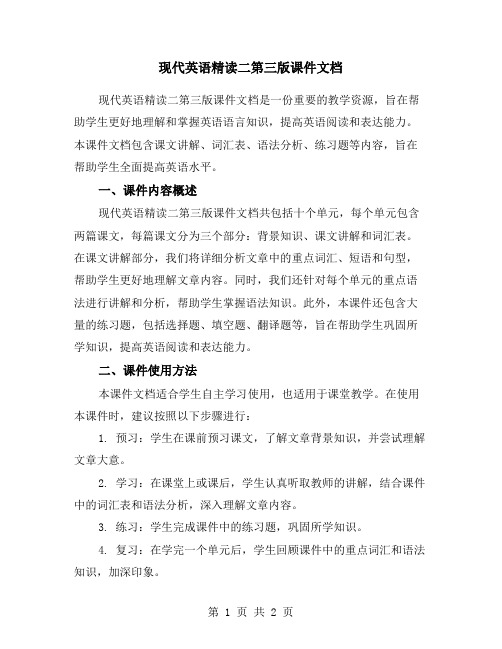
现代英语精读二第三版课件文档现代英语精读二第三版课件文档是一份重要的教学资源,旨在帮助学生更好地理解和掌握英语语言知识,提高英语阅读和表达能力。
本课件文档包含课文讲解、词汇表、语法分析、练习题等内容,旨在帮助学生全面提高英语水平。
一、课件内容概述现代英语精读二第三版课件文档共包括十个单元,每个单元包含两篇课文,每篇课文分为三个部分:背景知识、课文讲解和词汇表。
在课文讲解部分,我们将详细分析文章中的重点词汇、短语和句型,帮助学生更好地理解文章内容。
同时,我们还针对每个单元的重点语法进行讲解和分析,帮助学生掌握语法知识。
此外,本课件还包含大量的练习题,包括选择题、填空题、翻译题等,旨在帮助学生巩固所学知识,提高英语阅读和表达能力。
二、课件使用方法本课件文档适合学生自主学习使用,也适用于课堂教学。
在使用本课件时,建议按照以下步骤进行:1. 预习:学生在课前预习课文,了解文章背景知识,并尝试理解文章大意。
2. 学习:在课堂上或课后,学生认真听取教师的讲解,结合课件中的词汇表和语法分析,深入理解文章内容。
3. 练习:学生完成课件中的练习题,巩固所学知识。
4. 复习:在学完一个单元后,学生回顾课件中的重点词汇和语法知识,加深印象。
三、课件亮点分析1. 内容丰富:本课件包含丰富的课文讲解、词汇表、语法分析、练习题等内容,能够全面满足学生的学习需求。
2. 重点突出:在课文讲解部分,我们将重点词汇、短语和句型进行详细分析,帮助学生更好地理解文章内容。
同时,我们还针对每个单元的重点语法进行讲解和分析,让学生掌握语法知识。
3. 针对性强:本课件中的练习题具有很强的针对性,能够帮助学生巩固所学知识,提高英语阅读和表达能力。
4. 易于操作:本课件采用多媒体形式,界面简洁易懂,操作简单方便,适合各种水平的学生使用。
四、总结现代英语精读二第三版课件文档是一份高质量的教学资源,旨在帮助学生更好地理解和掌握英语语言知识,提高英语阅读和表达能力。
(完整word版)新视野大学英语(第三版)读写教程第二册完整教案.doc
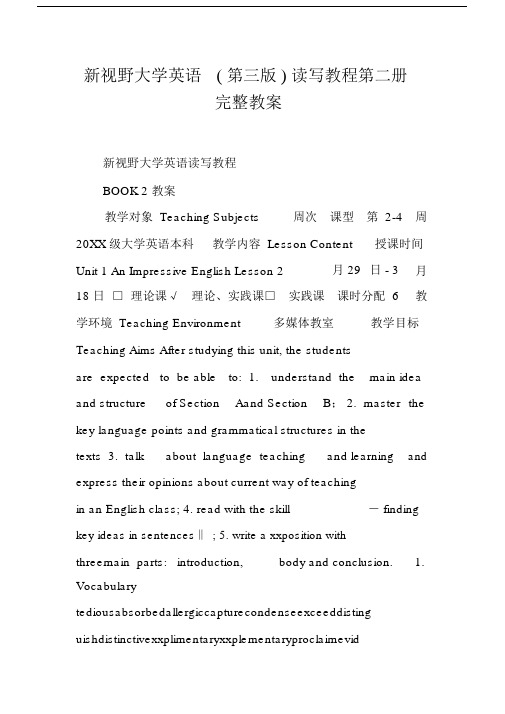
新视野大学英语( 第三版 ) 读写教程第二册完整教案新视野大学英语读写教程BOOK 2 教案教学对象 Teaching Subjects 周次课型第 2-4 周20XX 级大学英语本科教学内容 Lesson Content 授课时间Unit 1 An Impressive English Lesson 2 月 29 日 - 3 月18 日□理论课√ 理论、实践课□ 实践课课时分配 6 教学环境 Teaching Environment 多媒体教室教学目标Teaching Aims After studying this unit, the studentsare expected to be able to: 1. understand the main idea and structure of Section Aand Section B; 2. master the key language points and grammatical structures in thetexts 3. talk about language teaching and learning and express their opinions about current way of teachingin an English class; 4. read with the skill ― finding key ideas in sentences‖ ; 5. write a xxposition withthreemain parts: introduction, body and conclusion. 1. Vocabulary tediousabsorbedallergiccapturecondenseexceeddisting uishdistinctivexxplimentaryxxplementaryproclaimevidentlyadequatexxpetentadjustbeneficial 2. Skills ●Learn to read with the skill ― finding key ideas in sentences ‖and write a xxposition with threemain parts: introduction, body and conclusion. ● To talk about language teaching and learning ● write a xxposition with threemain parts: introduction, bodyand conclusion. ● To apply the phrases and patterns 重点 Key Issues 难点 PotentialProblems and Difficulties教学方法Methodology A xxbination of traditional teaching methods with the xxmunicative approach willbe adopted. Special attention should be paid to classroom interaction like questioning and answers.Small group works are always needed while discussingthe questions and the difficult translation encouragement is needed and more guidance will be given in their extracurricular study. Visual aids, projector, stereo and microphone 教具 Teaching Aids 教学分组Teaching Groups Group work and pair work 课堂学习任务与活动的组织 Conduct of Tasks and Activities Students-centered Task-based teaching and learning教学过程设计Teaching Procedures 步骤 1Step 1 导入Lead-in warming-up questions discussion. 1. What arethe key factors that help people learn English as aforeign language 2. Do you have any problem in Englishlearning you think grammar is important in Englishlearning II. Listening and discussing. 1. Listeningpractice. 2. In your opinion, what is the most effectiveway to learn English III. Listening to a talk and answer questions on page 2 步 2Step 2 文学 Section A An Impressive English Lesson I. New words 1. tedious: a.boring and continuing for too long冗乏味的Tellingthe story has bexxe tedious, as I have done it so manytimes. 述个故事已得乏味,因我已了么多次了。
新视野大学英语第三版第二册Unit3教案
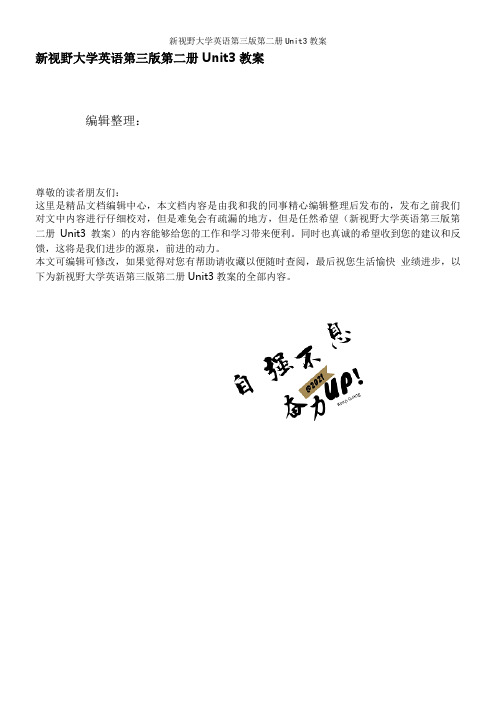
新视野大学英语第三版第二册Unit3教案编辑整理:尊敬的读者朋友们:这里是精品文档编辑中心,本文档内容是由我和我的同事精心编辑整理后发布的,发布之前我们对文中内容进行仔细校对,但是难免会有疏漏的地方,但是任然希望(新视野大学英语第三版第二册Unit3教案)的内容能够给您的工作和学习带来便利。
同时也真诚的希望收到您的建议和反馈,这将是我们进步的源泉,前进的动力。
本文可编辑可修改,如果觉得对您有帮助请收藏以便随时查阅,最后祝您生活愉快业绩进步,以下为新视野大学英语第三版第二册Unit3教案的全部内容。
B2 U3 A journey through the odyssey years教学重点:1.To have knowledge of Odyssey, Odysseus and the odyssey years2.To understand and use the words, phrases, structures,rhetoric in the text3.To be acquainted with the writing skills of acomparison/contrast essay教学难点:1.Apply the phrases and patterns2.Writing paragraphs with the structure of a comparison /contrast essay.教学过程:Part I Warm—upI。
Knowledge of The Odyssey, Odysseus, and the odyssey years 1.Assignment CheckStudents are going to share their assignments. Read our their reflection。
The assignment has to be given when students and the teacher last meet。
大学英语精读第三版第二册课文原文和翻译及课后习题
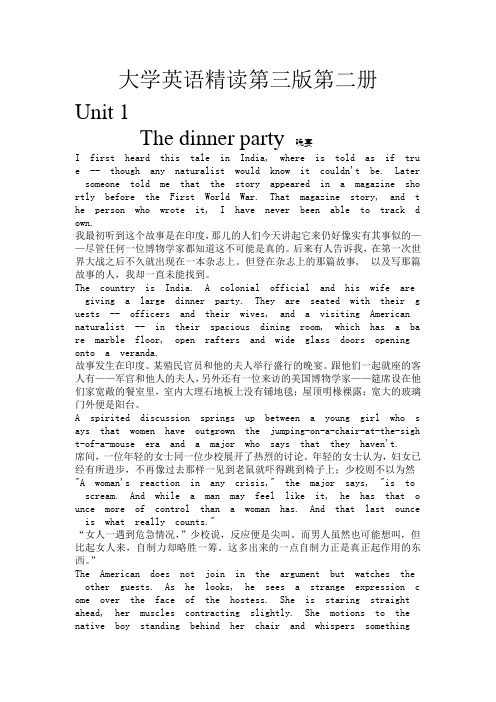
大学英语精读第三版第二册Unit 1The dinner party 晚宴I first heard this tale in India, where is told as if tru e -- though any naturalist would know it couldn't be. Later someone told me that the story appeared in a magazine sho rtly before the First World War. That magazine story, and t he person who wrote it, I have never been able to track d own.我最初听到这个故事是在印度,那儿的人们今天讲起它来仍好像实有其事似的——尽管任何一位博物学家都知道这不可能是真的。
后来有人告诉我,在第一次世界大战之后不久就出现在一本杂志上。
但登在杂志上的那篇故事, 以及写那篇故事的人,我却一直未能找到。
The country is India. A colonial official and his wife are giving a large dinner party. They are seated with their g uests -- officers and their wives, and a visiting American naturalist -- in their spacious dining room, which has a ba re marble floor, open rafters and wide glass doors opening onto a veranda.故事发生在印度。
某殖民官员和他的夫人举行盛行的晚宴。
跟他们一起就座的客人有——军官和他人的夫人,另外还有一位来访的美国博物学家——筵席设在他们家宽敞的餐室里,室内大理石地板上没有铺地毯;屋顶明椽裸露;宽大的玻璃门外便是阳台。
《大学英语精读》第三版第2册Unit_2_Lessons_from_Jefferson
Lessons from Jefferson
Useful expressions Text interpretation Word family Sentence structure Translation Reading skill Guided writing Homework
Text interpretation
What type is the text? A. narration B. exposition C. description D. argumentation
记叙文 说明文 描述文 议论文
The text is mainly an exposition of Jefferson’s insightful ideas.
Reading skill
3.
Using context clues for word meanings
Definition, restatement, general knowledge, related information, examples, comparison, contrast
7.
Word family
Declare, announce, independently, gain, in addition to, apart from, except for, investigate, appointment, originate, original, dissatisfaction, niece, hesitant, criticize, philosopher, resentful, temporary, remarkable, vice, sinful, idealist, inferior, influential, thrilled, heritage. More words on pp.35, 36, 37
(完整版)新视野大学英语第三版读写第二册unit2教案
(完整版)新视野大学英语第三版读写第二册unit2教案授课题目:College—The Ladder to Success?授课时间:第____周第____周授课类型:理论课授课时数:4教学目的:After finishing this unit, students will be able to:1.To talk about the significance of humanities;2.Get deeper insights into the text;3.Make creative use of words, phrases and sentence patterns;4.To master the essay writing skill: focus on an advantage\disadvantage;5.To read with the skill “reading for major details”.教学重点和难点:1.To further understand the text;2.To apply the words, phrases and sentence patterns;3.To read with the skill “reading for major details”;4.To write an essay with the skill “focus on an advantage\disadvantage”.教学方法和手段:Various kinds of teaching methods are used:1.Teaching in class. Explain the profound theoretical knowledge in class;2.Case study. Provide case study during teaching, and make the students to discuss about the case;3.Bilingual and full English teaching;4.Applying modern multimedia teaching technologies;5.Taking advantage of abundant network teaching resources.教学内容和过程:Section A The humanities: Out of date?Step One Warming-up Activities 30 minutesI.Lead-in:Discuss the following questions:1.How do you think of your current major? If you were givena second chance to choose your major, what would you select and why?—If I were given a second chance to choose my major, I would choose …/ I think being a … is …— accounting, computer science, psychology,—civil engineering, philo sophy, medical technology …—popular, interesting, enjoyable, promising, practical, meaningful, beneficial, well-pa id …2. What liberal arts / humanities courses do you learn in college? Do you think they are necessary for your education?—I learn Chinese, English, philosophy, psychology, history … in college. I think they are an essential part of the college education and benefit me a lot.gain more insight in life and societybetter understand and predict human behaviorrealize different interpretations of life and historyunderstand the past which has created the presentbe aware of cultural a nd religious differencesII.Cultural background1. What are the humanities?The humanities are a group of academic disciplines that study the human condition, using methods that are primarily analytical, critical, or speculative. Therefore, they are distinguished from the approaches of natural sciences. The humanities, called social sciences, include history, anthropology,communication studies, cultural studies, law, linguistics, etc.2. Why are the humanities important?Through exploration of the humanities, students learn how to think creativelyand critically, to reason, and to ask questions. Because these skills allow students to gain new insights into everything from poetry and paintings to business models and politics, humanistic subjects have been at the heart of a liberal arts education. Today, humanistic knowledge continues to provide the ideal foundation for exploring and understanding the human experience.Step Two Text Study 80 minutesI.Interactive reading of the text1. Reading comprehension1)Why do many students calculate they can’t major in English or history?2)Why does the author say that a college education is more and more seen as ameans for economic betterment rather than a means for human betterment?3)How do you understand “These days, labs are more vivid and compellingthan libraries” (Para. 3)?4)Why does the author say that the inner aspect of our being has captured ourimagination from the very beginning?5)According to the author, what are the advantages of studying the humanities?6)What are “well-rounded human beings” (Para. 10) according to the author?2. Structure of the textPart 1 (Para, 1-5) IntroductionTo improve their future chances of finding a job, college students are now moving away from the humanities and taking accounting or some “hard-skill” courses. The humanities will continue to be in bad shape due to the economic downturn. Nevertheless, the humanities can bring true value to people’s lives, and the basis of study of the humanities is formed by the inner power that has driven human beings to either greatness or destruction.Part 2 (Para. 6-9) Body: Why the humanities?This part presents the author’s argument to st and up for the true value that the humanities bring to people’s lives.Part 3 (Para 10) Concluding partThe humanities help to create human beings with insight and understanding of the passions, hopes and dreams common to all humanity. The humanities will never be out of date. They are as useful and relevant in our modern age as they have always been.3. Summary of the TextRetell the text according to the following tips.1)(Part I) When the job market worsens, many students calculate ... Probably, the huma nities will continue …. Once …, the humanities now …2)(Part II) Here, please allow me to … that the humanities add to people’s lives. Studying the humanities improves… Most importantly, studying the humanities invests us with …, thereby… Perhaps the best argument in favor of the humanities is… In fact, increasingly… is seen as the ideal in…3)(Part III) In summ ary, the humanities help to create …, teach us to … and… It makes sense to …, our outstanding andremarkable …/doc/e2acb604e65c3b3567ec102de2bd960 591c6d940.html nguage FocusWords and expressions1. when the going gets tough: when the situation becomes difficultWhen the going gets tough, women can get as tough as men.当形势变得严峻时,女人可以变得跟男人一样坚强。
大学英语精读第三版教案
一、教学目标1. 理解课文内容,掌握本单元的中心思想和文章结构。
2. 掌握新单词、句型的使用方法,提高听说能力。
3. 学会运用阅读技巧,寻找关键词和句,提高阅读速度和理解能力。
4. 培养学生自主学习、自我探究的学习方式,激发学习潜能。
二、教学重点与难点1. 重点:课文内容的理解,新单词、句型的掌握,阅读技巧的应用。
2. 难点:文章结构的分析,新单词、句型的运用,阅读技巧的掌握。
三、教学过程(一)导入新课1. 引导学生回顾上一单元的学习内容,巩固所学知识。
2. 提出本单元的学习目标,让学生明确学习任务。
(二)课文精读1. 阅读课文,理解文章内容,掌握文章结构。
2. 分析文章中的关键词汇和句型,引导学生进行翻译和造句。
3. 分析文章的写作手法,如比喻、拟人等,提高学生的写作水平。
(三)听说训练1. 组织学生进行听力练习,提高学生的听力水平。
2. 引导学生进行口语练习,提高学生的口语表达能力。
(四)阅读技巧训练1. 讲解阅读技巧,如快速寻找关键词、句,提高阅读速度。
2. 组织学生进行阅读练习,让学生运用所学技巧进行阅读。
(五)课堂小结1. 回顾本节课所学内容,巩固所学知识。
2. 布置课后作业,让学生巩固所学知识。
四、教学建议1. 教师在讲解课文时,应注重启发学生思考,引导学生自主学习。
2. 在进行听说训练时,教师要鼓励学生积极参与,提高学生的口语表达能力。
3. 在进行阅读技巧训练时,教师要注重培养学生的阅读兴趣,提高学生的阅读能力。
4. 教师要关注学生的个体差异,因材施教,使每个学生都能得到充分的发展。
五、课后作业1. 翻译课文中的生词和句型。
2. 用所学的阅读技巧阅读一篇英文文章,并总结文章的主要内容。
3. 准备下一节课的口语练习内容。
六、教学反思1. 教师要及时总结教学过程中的优点和不足,不断改进教学方法。
2. 关注学生的学习效果,及时调整教学进度和内容。
3. 注重培养学生的自主学习能力,激发学生的学习潜能。
大学英语精读3unit2教案
一、教学目标1. 知识目标:(1)掌握本单元生词、短语和语法点;(2)理解课文内容,提高阅读理解能力;(3)学习作者写作技巧,培养批判性思维。
2. 能力目标:(1)提高英语听说读写能力;(2)提高跨文化交际能力;(3)培养独立思考和解决问题的能力。
二、教学重点1. 课文生词、短语和语法点的学习;2. 课文内容的理解;3. 作者写作技巧的学习。
三、教学难点1. 课文内容的理解;2. 作者写作技巧的掌握。
四、教学过程(一)导入(10分钟)1. 复习上一单元的课文,引导学生回顾所学知识;2. 提出本单元的学习目标,让学生明确学习任务。
(二)新课讲解(30分钟)1. 课文生词、短语和语法点的讲解;2. 课文内容的分析,引导学生理解课文大意;3. 作者写作技巧的讲解,如:修辞手法、段落结构等。
(三)课堂练习(20分钟)1. 针对课文内容,设计一些选择题、判断题等,检验学生对课文的理解;2. 针对课文中的语法点,设计一些填空题、改错题等,检验学生对语法点的掌握;3. 针对作者写作技巧,设计一些仿写题,提高学生的写作能力。
(四)课堂讨论(20分钟)1. 引导学生就课文内容展开讨论,培养学生的批判性思维;2. 邀请学生分享自己的观点,提高学生的口语表达能力。
(五)总结与作业布置(10分钟)1. 总结本节课的学习内容,强调重点和难点;2. 布置课后作业,如:阅读课文、完成课后练习、撰写读书笔记等。
五、教学反思1. 本节课是否达到了预期的教学目标;2. 学生对课文内容的理解程度;3. 学生对语法点的掌握程度;4. 学生在课堂讨论中的表现;5. 教学过程中存在的问题及改进措施。
六、教学资源1. 教材《大学英语精读3》;2. 课件、教案、习题等教学辅助材料;3. 网络资源,如:英语学习网站、英语学习软件等。
七、教学评价1. 课堂表现:学生的出勤率、参与度、合作精神等;2. 作业完成情况:作业的质量、数量、按时完成情况等;3. 考试成绩:学生的考试成绩,包括平时成绩和期末成绩。
- 1、下载文档前请自行甄别文档内容的完整性,平台不提供额外的编辑、内容补充、找答案等附加服务。
- 2、"仅部分预览"的文档,不可在线预览部分如存在完整性等问题,可反馈申请退款(可完整预览的文档不适用该条件!)。
- 3、如文档侵犯您的权益,请联系客服反馈,我们会尽快为您处理(人工客服工作时间:9:00-18:30)。
大学英语精读第三版第二册教案
教案标题:大学英语精读第三版第二册教案
教学目标:
1. 帮助学生提高大学英语阅读能力,包括理解文章主旨、理解文章细节、推理推断等。
2. 培养学生的词汇积累能力,扩大学生的词汇量。
3. 培养学生的阅读策略,提高学生的阅读速度和理解能力。
教学重点:
1. 学会运用阅读策略,如预测、扫读、略读等,提高阅读效率。
2. 掌握文章主旨及细节的理解技巧。
3. 培养学生的词汇积累能力,扩大学生的词汇量。
教学难点:
1. 培养学生的阅读策略,使其能够在有限时间内快速获取文章信息。
2. 帮助学生理解并运用文章中的高级词汇和语法结构。
教学准备:
1. 大学英语精读第三版第二册教材及相关教辅资料。
2. 多媒体设备和投影仪。
3. 复印教材相关文章和练习题。
教学过程:
一、导入(5分钟)
1. 利用多媒体设备播放与本课相关的图片或视频,激发学生对话题的兴趣。
2. 引导学生回忆上一课时的内容,过渡到本课的学习。
二、预习导入(10分钟)
1. 让学生自主阅读课文标题、段落标题和图片等,预测文章内容。
2. 鼓励学生提出问题并讨论,激发学生的思考和好奇心。
三、阅读训练(30分钟)
1. 分段教学,引导学生通过扫读和略读等阅读策略快速获取文章主旨和细节信息。
2. 针对每个段落的重点句子和难点词汇进行解读和讲解。
3. 组织学生进行小组讨论,分享对文章的理解和感受。
四、词汇拓展(15分钟)
1. 教师呈现并讲解本课文章中的重点词汇和短语。
2. 组织学生进行词汇拓展活动,如词义辨析、词汇运用等。
五、语法点讲解(10分钟)
1. 教师讲解本课文章中的重点语法结构,并与学生一起进行练习。
2. 引导学生在阅读中注意语法结构的运用和理解。
六、练习与巩固(15分钟)
1. 分发练习题,让学生进行阅读理解和语法填空等练习。
2. 引导学生相互检查答案,并进行讲解和讨论。
七、总结与反思(5分钟)
1. 教师对本课的教学进行总结,强调重点和难点。
2. 鼓励学生提出问题和反思,促进学生对学习的思考和反思。
教学辅助措施:
1. 利用多媒体设备展示相关图片和视频,激发学生的兴趣。
2. 通过小组讨论和合作学习等方式,促进学生的互动和参与度。
教学评估:
1. 教师观察学生在课堂上的表现,包括参与度、理解程度等。
2. 批改学生的练习题,评估学生对课文的理解和运用能力。
拓展延伸:
1. 鼓励学生在课后进行更多的阅读练习,提高阅读速度和理解能力。
2. 推荐相关的英语阅读材料和网站,帮助学生拓宽阅读广度和深度。
以上是一份关于大学英语精读第三版第二册教案的基本框架,根据具体情况和学生需求,可以进行适当的调整和完善。
